SEO
How to Use HARO (And Alternatives) to Get Killer Backlinks
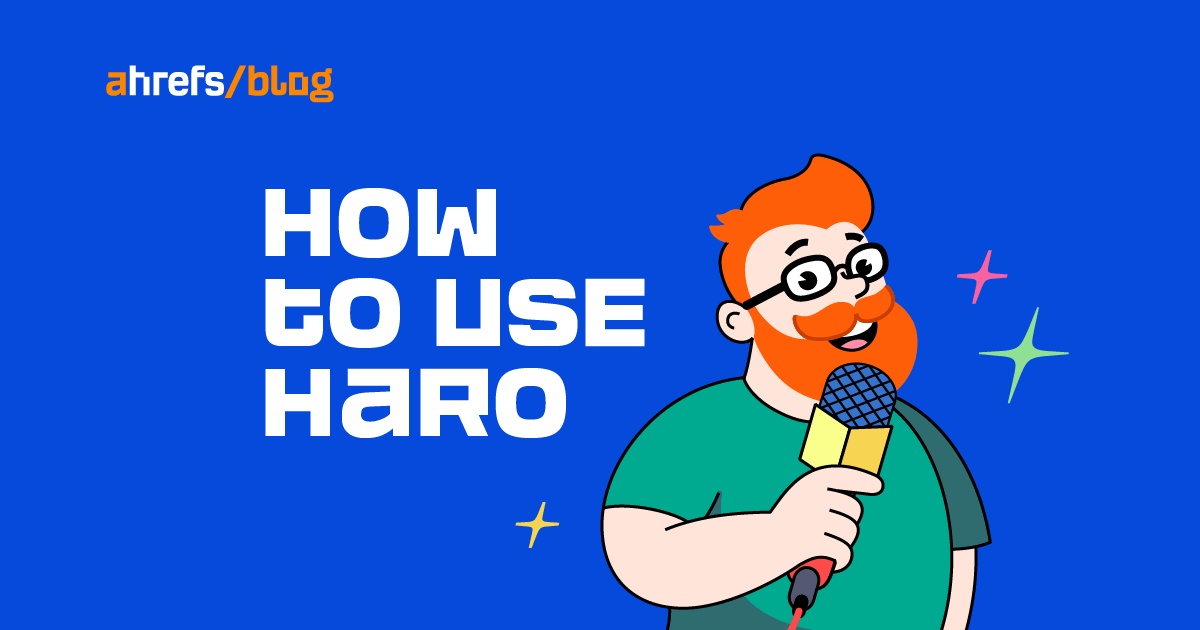
HARO link building has taken the SEO industry by storm over the last few years. But today, actually getting results is hard work. HARO is oversaturated, and results are not guaranteed.
So should you still try to get media coverage this way? Absolutely! There are tons of links up for grabs. Not just any links. Super high authority links that can drive traffic, leads, and sales.
But how do you get ahead of the competition? As someone who has had great success using earned media platforms like HARO as a means of building top-notch links over the years, I’m going to give you my tips and tricks on how to get killer backlinks using HARO and alternatives.
But first, let’s get familiar with everything HARO can actually do for you.
Help a Reporter Out, or HARO from Cision, is the best-known platform for journalists’ requests. You receive daily emails filled with opportunities across topics like marketing, lifestyle, business, etc.
But how does it work? First, you should sign up as a source.

After you sign up, you’ll get three emails a day—at 5:35 a.m., 12:35 p.m., and 5:35 p.m. ET from Monday to Friday.
The emails will be broken down into different categories. Here’s an example of an email you’ll receive:

Each request will have a title and an outlet in brackets. You’ll want to browse through the email and find relevant topics that you can contribute to.
Once you’ve given the service a spin, it’s definitely worth considering upgrading to a paid HARO account. There are many additional features that become available, which can give you a competitive edge when pitching.
Here’s a quick rundown on HARO Premium.
There are four subscription levels available (including the free option):

For most purposes, the Standard account at $19 a month will be more than sufficient.
The first advantage of a paid subscription is you can set up a profile/bio that will be automatically inserted into your pitches.
The bio includes links to web properties and social media. These all help to build credibility and authority when pitching to journalists.
You can also add details on your specific areas of expertise and any publications you have previously been featured in.

As with the free account, you can subscribe to opportunities in specific verticals. But with a paid subscription, you can also set up alerts for media requests that match specified keywords. You can even get SMS alerts if you are in the U.S.
In the example below, I have subscribed to the “Master Haro,” “Business and Finance,” and “High Tech” emails. I have also set up an alert for the keyword “SEO.”

From now on, I’ll get an email alert like this whenever new media requests include the keyword “SEO”:

Another nice feature is the ability to browse and respond to queries directly through the online interface.

You can even search queries by keyword.

As you can see, the paid HARO accounts offer a nice bunch of extra features to help you secure media mentions.
When it comes to using digital PR, and in particular earned media techniques, there are a few things you need to take into consideration to be truly successful at building high-quality links:
- Take your time
- React quickly
- Choose wisely
- Focus on the right things
- Craft quality pitches
- Use the right platforms
Let’s take a look at these more closely.
Take your time
Here’s the thing about reactive PR: It’s a long game. Although you can gain incredible backlinks from super high authority websites like Forbes, The New York Times, WebMD, etc., this process isn’t instantaneous.
You have to remember that, with the nature of reactive PR, journalists are posting queries often before writing their content. So they need to filter through all of the responses to find a relevant one, get an article written and edited, as well as get it published.
All before you can get the glory of that one mega link.
Depending on how far in advance they prepare their content calendar, it can easily take six to eight weeks to see these queries published. That’s why when working with clients, I always tell them to expect to wait a minimum of six weeks to start seeing a steady flow of links.
But it is really important to be working away continuously in the background so that once you do start seeing movement, you’ve already built up a steady pipeline to maintain continued high-quality link acquisition.
React quickly
Journalists can get even thousands of responses to each query they post. Platforms like HARO are incredibly saturated with agencies and freelancers offering HARO link building services, and they are all trying to land killer links.
For two reasons, being as quick as possible when responding to queries improves your chances of being successful.
First, you stand a better chance of being seen by a journalist.
As journalists get so many queries, they will often stop reading new responses if they have already found what they are looking for. So even if you craft an amazing pitch, it may not be opened if someone else has beaten you to the punch.
Secondly, because of the high volume of responses journalists get, many are setting same-day deadlines for queries to avoid being bombarded with irrelevant pitches.
Recently, more and more queries are coming through with an end-of-day PST deadline. If you skip a day or don’t check for new queries until late afternoon, you could miss out on the chance to be featured on your dream site.
That being said, it can be difficult to reply to journalists quickly if you are relying on others (like clients or co-workers) to give expert commentary. Here are some things you can do to help you respond to your most relevant queries as quickly as possible:
- Gather soundbites from your experts – Keep copies of all of the commentary you have previously sent on behalf of your clients. If a similar query comes up, you can send a quality response without needing to go back to your clients.
- Use your client’s website for info – Similar to the point above, when working with a client, I’m always sure to gather some great speaking points from the content already available on their “about” page and blog that I can paraphrase as a quick response.
- Set up filters and alerts – By using email filters and alerts, you can ensure you are being notified quickly about only the most relevant queries. That way, you don’t need to waste time reading every query in every email.
- Use a paid HARO account – Again, this is similar to setting up an email filter. But a paid HARO account allows you to select the types of queries you want to be notified about. So you’ll only receive emails with queries that are relevant to you. Higher-tier plans even allow you to get the queries a bit sooner.
Choose relevant queries
First, make sure you meet the journalist’s requirements and are qualified to answer a specific query before wasting your (and the journalist’s) time.
TIP
Only answer queries that are highly relevant. As journalists get so many queries, they blacklist emails they consider “timewasters.”
One mistake I see time and time again is people focusing on certain metrics rather than the queries they are most qualified to answer. In doing so, they hinder their chances of success.
Here’s one I’ve heard a million times before: “I only want dofollow links above DR 60 on a site in my niche.”
Here’s the thing: If you aren’t getting results that contribute toward your marketing objectives, these are simply vanity metrics.
With any earned media coverage, you should strive to achieve at least one of the following:
- Get exposure to the target audience
- Gain valuable link equity to help your content rank better in organic search
- Convert referral traffic
That’s why it is important to establish a clear strategy with reactive PR. Using competitor analysis and truly understanding your target audience can allow you to focus your efforts on acquiring links that most offer value and increase the return on investment (ROI).
Filter domains worth pursuing
It is important to ensure any queries you respond to are for sites you actually want to be published on. You should check that the site aligns with your personal and professional viewpoints and is of high quality.
Use Ahrefs’ Site Explorer to check out the website’s traffic and backlinks.
By simply plugging the potential site from the HARO query in Site Explorer, you can bring up a quick overview of the site’s metrics, including the Domain Rating (DR) and traffic.

So for this example, the metrics look great, with high authority and a huge amount of organic traffic. But we also want to take a look at the site’s backlink profile. Avoid anything that looks like it’s full of spam links. You can check this in the Backlinks report in Site Explorer:

Lastly, head over to the site and check out some of the most recent posts. Make sure the content is high quality and offers value to the reader.
The more you work with HARO, the more you realize there are a number of sites that essentially create an entire piece of content solely by collecting HARO responses. They are full of external links to sites (diluting that all-important link equity) and have questionable quality.
There is no point in getting links on a site in your niche solely because it is above a certain DR. Instead, aim to receive a link on a site that has huge visibility, has value to your target audience, and drives relevant traffic and qualified leads to your website with quality content.
Craft quality pitches
When it comes to HARO link building, it’s all about being pitch-perfect. Writing pitches that journalists want to include in their content is the key to success.
Here are some tried and tested proven techniques for writing pitches that convert into published links.
Work with multiple personas
My personal top tip when using HARO is to work with multiple personas.
Many people make the mistake of only pitching journalists on behalf of the CEO or founder of a company. But most companies have experts across multiple departments, such as the HR manager, chief marketing officer, head of content, and so on.
This not only gives you the opportunity to go after more queries, but it also gives a face and a voice to integral team members, building trust with potential customers.
Add value
Pitches must be unique. Ask yourself if each sentence is required and if it adds value for the journalist.
Be mindful of what is already ranked on the search engine results pages (SERPs) for the topic and consider how you may add value that goes beyond what is already out there. Think outside of the box and try to offer something different while still showcasing your expertise.
Showcase your personality
Every pitch is dependent on you, the subject matter expert. Your quotes should inform and entertain the journalist. When sharing your knowledge, use analogies and your personal viewpoints.
To connect with the journalist and their audience, write in a direct and casual style almost as if you were speaking to a friend. Be sure to also deliver your expertise in a non-patronizing way.
Keep it short
Journalists receive literally thousands of pitches for each inquiry. They definitely don’t want to read “War and Peace.”
Unless there is an occasion where you need to give exceedingly technical details, your pitch should generally be between 200 and 300 words.
Make sure your pitch covers what the journalist requested in the inquiry and addresses the topical subject.
Take time to include the essentials
Reading a journalist’s inquiry fully and taking the time to include some key essentials will make the difference when it comes to success. Here are my top things to consider:
- Subject lines: Remember, journalists will skim their inboxes for the most relevant queries. Always include the title of the query, the person pitching, their role and company, and their experience. Example: “RE: How to screw in a light bulb – John Doe – Engineer at Phillips – 15 years of experience screwing in light bulbs.”
- Personalize your pitch: Always include the journalist’s name where possible. More often than not, you can establish an ongoing relationship with them and become a go-to source outside of HARO. So taking the time to personalize your pitch makes a difference.
- Intros and outros: Always include a short introduction that explains who you are and why you’re an expert on the topic you are pitching. Also, be sure to sign off by letting the journalist know you’re happy to answer any additional questions should they need to follow up. And add that you’ll be happy to share their article on social media when it goes live.
Pitch-perfect template
Here is my template for the perfect pitch:
Hey [JOURNALIST NAME],
[INTRO PARAGRAPH]
[PITCH]
[SIGN OFF]
As the pitch is the focus, it is important to ensure you answer different types of queries with different pitch styles. Let’s look at some examples of the different types of queries and publish-perfect pitches.
Advice queries
Query: How to respond when a date cancels on you
Pitch: The best response is to remain calm and relaxed and say something like “Thanks for letting me know” and leave it there. I wouldn’t at this point suggest another date for several reasons. They’ve canceled on you, so I’d leave the ball in their court to suggest another date. If you’re the one trying to rearrange, you run the risk of coming across as desperate and needy.
Business queries
Query: Challenges faced in building your business
Pitch: The top challenges I faced were fund management and hiring suitable people. The first staff I hired only stayed for about three weeks, as they found the job repetitive or realized it was just not for them. Finding people who live and breathe your mission is challenging. It took time to filter candidates to avoid the same thing happening again.
Product selection queries
Query: Choosing a gaming PC
Pitch: As an avid streamer on Twitch and a lover of gaming since I was a kid, here are my thoughts: PC gaming is in a class of its own. If you’re going to invest in a new gaming computer, here are some important things to consider before you start your search.
Budget: You have got to start with your budget, of course! You may be surprised to find that a custom-built gaming computer may not be out of your reach, so keep that in mind!
Graphics card: High-end graphics cards are rare, so it’s probably best to purchase a mid-range card and adjust your game settings accordingly.
RAM: When it comes to memory, it isn’t too expensive right now. So I’d suggest you go for at least 8 GB.
Storage and audio coms: Other things to consider are storage and audio coms. If you plan on playing online multiplayer games, you will also need a quality headset with a microphone.
Product recommendation queries
Query: Best travel duffel
Pitch: The Patagonia Black Hole Duffel is made for any type of trip. I’ve put mine through the paces, taking it on surf trips to Central America, having it during ski trips in the Rockies, and even using it as a giant cooler by packing it full of ice. It has never ripped, torn, or complained about how much stuff I’ve jammed inside it.
Another cool feature: This bag folds up into its front pocket for easy storage when not in use.
Use the right platforms
As mentioned previously, HARO has become incredibly saturated over the last few years. This means there is significantly more competition, and it takes a lot more time and dedication to land solid links.
Even those of us who have been doing HARO link building for a long time are lucky to get a success rate of around one link for every six pitches these days. For those with less experience, that’s going to look more like one link for every 10 or 12 pitches.
That means if you’re hoping to get 10 links per month, you’re probably going to need to send at least 100 pitches to see success.
But here’s the issue with that. As this technique is reactive, that means we can only respond to what journalists post. It’s not like guest posting, where we can find sites we want and pitch them our ideas for a new article.
Getting 100+ relevant queries on one platform is difficult, so the best option is to use multiple outlets. Because newer platforms have less competition, often meaning you can get success from fewer pitches. Also, because there are more available queries.
I’m going to talk you through my tried and tested favorite HARO alternatives, the pros and cons of each one, as well as my top tips for success. We’re going to look at Terkel, Help a B2B Writer, and PressPlugs.
Free and paid
Terkel is aptly named after Louis “Studs” Terkel, a writer and broadcaster who spent his career striving to give a voice to everyday people. It has a mission to offer a platform for small businesses to have their expertise shared across the biggest global outlets.
Terkel is an all-in-one platform that offers high-quality queries from some of the biggest platforms worldwide.
How does Terkel work?
First, you will need to head over to Terkel and sign up for a free account. This will allow you to answer five queries per month with basic information about the websites you’re pitching.
You will need to set up a profile that includes a high-quality headshot and your social links, as these will be a contributing factor as to whether your answers get used by journalists.
You can also select the different types of queries you want to respond to, such as marketing, business, lifestyle, etc.
Once set up, you will find everything you need within the Terkel platform. There’s no messing around with emails here; the current open queries are all listed under the “Questions” tab.

You can also answer queries directly on the platform itself.

Terkel has its own algorithm that calculates a source’s expertise based on the number of pitches they send and how many of those are successful. With that, each user is assigned an “expertise score,” which can help Terkel match sources with relevant queries.
That way, it only needs to send emails to let you know about the most relevant queries as and when they appear rather than on a set schedule. That’s why with Terkel, it is really important to only answer relevant queries. If you don’t, it can hinder your expertise score.
As an SEO geek, I also love that Terkel uses Bing’s API to pull in suggested keywords and displays these while you’re pitching, helping you meet search intent.
Terkel offers free and paid options. With the free version, you can send up to five pitches a month from a basic selection.
With the paid option (which is very affordable), you get unlimited pitches, exclusive opportunities, as well as additional information about the sites (which you can filter), such as DR and the type of link attribute.
Pros
One of my personal favorite features of Terkel is the “Track your answers” system.
Basically, the team at Terkel preapproves every query before sending the most relevant from the best experts to the journalists. This is a huge benefit for publishers (as they aren’t being bombarded with irrelevant pitches), and it also offers instant feedback.
Especially when you compare your pitches, which have been selected by the Terkel team, against those that have been used by journalists. You can use these comparisons to see where your pitches have fallen short and adjust your strategy moving forward.
Cons
The only thing that currently lets Terkel down for me is the fact that it is still a new platform, meaning there are fewer publishers on it than on others.
This is not a huge problem for a small business wanting to get the word out about itself. But for a full-time PR freelancer or an agency, it means you usually need to use Terkel in conjunction with something else to meet the number of links you need.
However, this likely won’t be an issue for long as more publishers sign up with Terkel by the day.
Tips for success
What better way to get a top tip than to find out from Terkel directly? I spoke with Brett Farmiloe, founder of Terkel, who gave this advice:
Quality comes first. We define quality using the “E-A-T” acronym. To be successful on Terkel, make sure you’re answering questions that speak to your expertise. Use your real identity so that publishers can trust your insights. And focus on being the authority of a specific area.
Free
Help a B2B Writer is a new platform that works in a similar way to HARO, sending daily emails with available opportunities across a number of different niches.
With Help a B2B Writer, the queries are often from super high authority, well-known B2B SaaS brands based in the U.S., such as Zapier. This is great for anyone working with small and medium B2B businesses.
How does Help a B2B Writer work?
You’ll need to start by registering as a source and selecting the types of queries you are interested in, such as social media marketing, SEO, etc.

From Monday to Friday at 3 p.m. BST, Help a B2B Writer emails sources with journo requests that look like this:

Help a B2B Writer is completely free. The platform proudly clarifies this: “Sources don’t need to pay anything to be on the list; it’s free for writers to submit requests.”
Pros
Something that makes Help a B2B Writer unique is that you can let the journalist know where you want them to link to. This is unlike HARO, where links are always to the homepage of your website. For this platform, you can specify an individual page, a portfolio, or a social channel.
This is great for helping to build topical authority. For example, if I’m quoted in an article about affiliate marketing and I link back to a page on my website on the same topic, this helps to build topical authority better than a general link to the homepage.
Cons
Help a B2B Writer is a relatively new platform, and I am still testing the waters. To date, I have seen queries from some amazing sites, but I have also seen a number of pitches published in articles without any links and, in some cases, without even a mention.
It seems a lot of the writers posting queries are using the responses to essentially write entire articles rather than using responses as a source for expert commentary as intended.
Keep that in mind when responding and try to go for as many opportunities as possible (where relevant, of course). But also, don’t be shy about reporting writers who are abusing the platform in this way.
Tips for success
Help a B2B Writer recommends using screenshots and data where possible to back up insights:
Screenshots and unique data are for writers what catnip is to cats. We love it. Not only does it save time, it helps writers illustrate points with enriching add-ons, like relevant data and visuals.
Paid
PressPlugs is one of my favorite resources for earning high-authority placements for the clients I work with in the U.K. The platform has received queries from journalists working for some of the biggest U.K. publications, including Metro, The Telegraph, and The Daily Mail.
Like Terkel, PressPlugs is a platform that hosts its own journo requests.
Notably, it is a paid platform. But as someone who works with U.K. clients, I find the small monthly fee is worth the number of opportunities available.
How does PressPlugs work?
You’ll need to start by signing up for a seven-day free trial in order to gain access to the platform.

Once you have an account, you can log in to the platform and access the available media opportunities, which you can filter by category, deadline, or even journalist.

When you find an opportunity that looks relevant to you, you can simply click on it to expand and see the full details.

Pros
One of the great things about PressPlugs is that each request details the name of the journalist as well as their direct email. If you’re a PR pro, you can take this information and start building up a database that you can use to pitch relevant ideas and creative campaigns.
Cons
The number of emails you receive from PressPlugs is beyond excessive. You are likely to miss important emails if you keep these turned on. For me, I have to disable the email notifications (one email for every new query posted!) and work directly on the platform.
This platform is designed specifically for U.K. publications. So if you are a U.S. company, this platform may not offer as much value for you as some of the others.
Tips for success
I spoke with Tracy Nolan, co-founder at PressPlugs, to get her top tips for success when using the platform. She had this advice:
Always treat journalists with respect and only go after opportunities where you are a good match. Speculative long shots are not helpful and will mean the journalist will be more reluctant to look at future pitches. Always play the long game and be as helpful as you can.
Final thoughts
Unlike most link building tactics, HARO and other earned media platforms are excellent ways of generating high-quality backlinks and press mentions. Just keep in mind that they require a bit of patience, and you’ll need to provide high-quality responses to the inquiries.
Nevertheless, for the level of effort required compared to the potential gain, it’s definitely worth your time.
Got a favorite I didn’t mention? I want to know! Of course, if you have any questions, ping me on Twitter.
SEO
2024 WordPress Vulnerability Report Shows Errors Sites Keep Making

WordPress security scanner WPScan’s 2024 WordPress vulnerability report calls attention to WordPress vulnerability trends and suggests the kinds of things website publishers (and SEOs) should be looking out for.
Some of the key findings from the report were that just over 20% of vulnerabilities were rated as high or critical level threats, with medium severity threats, at 67% of reported vulnerabilities, making up the majority. Many regard medium level vulnerabilities as if they are low-level threats and that’s a mistake because they’re not low level and should be regarded as deserving attention.
The WPScan report advised:
“While severity doesn’t translate directly to the risk of exploitation, it’s an important guideline for website owners to make an educated decision about when to disable or update the extension.”
WordPress Vulnerability Severity Distribution
Critical level vulnerabilities, the highest level of threat, represented only 2.38% of vulnerabilities, which is essentially good news for WordPress publishers. Yet as mentioned earlier, when combined with the percentages of high level threats (17.68%) the number or concerning vulnerabilities rises to almost 20%.
Here are the percentages by severity ratings:
- Critical 2.38%
- Low 12.83%
- High 17.68%
- Medium 67.12%
Authenticated Versus Unauthenticated
Authenticated vulnerabilities are those that require an attacker to first attain user credentials and their accompanying permission levels in order to exploit a particular vulnerability. Exploits that require subscriber-level authentication are the most exploitable of the authenticated exploits and those that require administrator level access present the least risk (although not always a low risk for a variety of reasons).
Unauthenticated attacks are generally the easiest to exploit because anyone can launch an attack without having to first acquire a user credential.
The WPScan vulnerability report found that about 22% of reported vulnerabilities required subscriber level or no authentication at all, representing the most exploitable vulnerabilities. On the other end of the scale of the exploitability are vulnerabilities requiring admin permission levels representing a total of 30.71% of reported vulnerabilities.
Permission Levels Required For Exploits
Vulnerabilities requiring administrator level credentials represented the highest percentage of exploits, followed by Cross Site Request Forgery (CSRF) with 24.74% of vulnerabilities. This is interesting because CSRF is an attack that uses social engineering to get a victim to click a link from which the user’s permission levels are acquired. This is a mistake that WordPress publishers should be aware of because all it takes is for an admin level user to follow a link which then enables the hacker to assume admin level privileges to the WordPress website.
The following is the percentages of exploits ordered by roles necessary to launch an attack.
Ascending Order Of User Roles For Vulnerabilities
- Author 2.19%
- Subscriber 10.4%
- Unauthenticated 12.35%
- Contributor 19.62%
- CSRF 24.74%
- Admin 30.71%
Most Common Vulnerability Types Requiring Minimal Authentication
Broken Access Control in the context of WordPress refers to a security failure that can allow an attacker without necessary permission credentials to gain access to higher credential permissions.
In the section of the report that looks at the occurrences and vulnerabilities underlying unauthenticated or subscriber level vulnerabilities reported (Occurrence vs Vulnerability on Unauthenticated or Subscriber+ reports), WPScan breaks down the percentages for each vulnerability type that is most common for exploits that are the easiest to launch (because they require minimal to no user credential authentication).
The WPScan threat report noted that Broken Access Control represents a whopping 84.99% followed by SQL injection (20.64%).
The Open Worldwide Application Security Project (OWASP) defines Broken Access Control as:
“Access control, sometimes called authorization, is how a web application grants access to content and functions to some users and not others. These checks are performed after authentication, and govern what ‘authorized’ users are allowed to do.
Access control sounds like a simple problem but is insidiously difficult to implement correctly. A web application’s access control model is closely tied to the content and functions that the site provides. In addition, the users may fall into a number of groups or roles with different abilities or privileges.”
SQL injection, at 20.64% represents the second most prevalent type of vulnerability, which WPScan referred to as both “high severity and risk” in the context of vulnerabilities requiring minimal authentication levels because attackers can access and/or tamper with the database which is the heart of every WordPress website.
These are the percentages:
- Broken Access Control 84.99%
- SQL Injection 20.64%
- Cross-Site Scripting 9.4%
- Unauthenticated Arbitrary File Upload 5.28%
- Sensitive Data Disclosure 4.59%
- Insecure Direct Object Reference (IDOR) 3.67%
- Remote Code Execution 2.52%
- Other 14.45%
Vulnerabilities In The WordPress Core Itself
The overwhelming majority of vulnerability issues were reported in third-party plugins and themes. However, there were in 2023 a total of 13 vulnerabilities reported in the WordPress core itself. Out of the thirteen vulnerabilities only one of them was rated as a high severity threat, which is the second highest level, with Critical being the highest level vulnerability threat, a rating scoring system maintained by the Common Vulnerability Scoring System (CVSS).
The WordPress core platform itself is held to the highest standards and benefits from a worldwide community that is vigilant in discovering and patching vulnerabilities.
Website Security Should Be Considered As Technical SEO
Site audits don’t normally cover website security but in my opinion every responsible audit should at least talk about security headers. As I’ve been saying for years, website security quickly becomes an SEO issue once a website’s ranking start disappearing from the search engine results pages (SERPs) due to being compromised by a vulnerability. That’s why it’s critical to be proactive about website security.
According to the WPScan report, the main point of entry for hacked websites were leaked credentials and weak passwords. Ensuring strong password standards plus two-factor authentication is an important part of every website’s security stance.
Using security headers is another way to help protect against Cross-Site Scripting and other kinds of vulnerabilities.
Lastly, a WordPress firewall and website hardening are also useful proactive approaches to website security. I once added a forum to a brand new website I created and it was immediately under attack within minutes. Believe it or not, virtually every website worldwide is under attack 24 hours a day by bots scanning for vulnerabilities.
Read the WPScan Report:
WPScan 2024 Website Threat Report
Featured Image by Shutterstock/Ljupco Smokovski
SEO
An In-Depth Guide And Best Practices For Mobile SEO
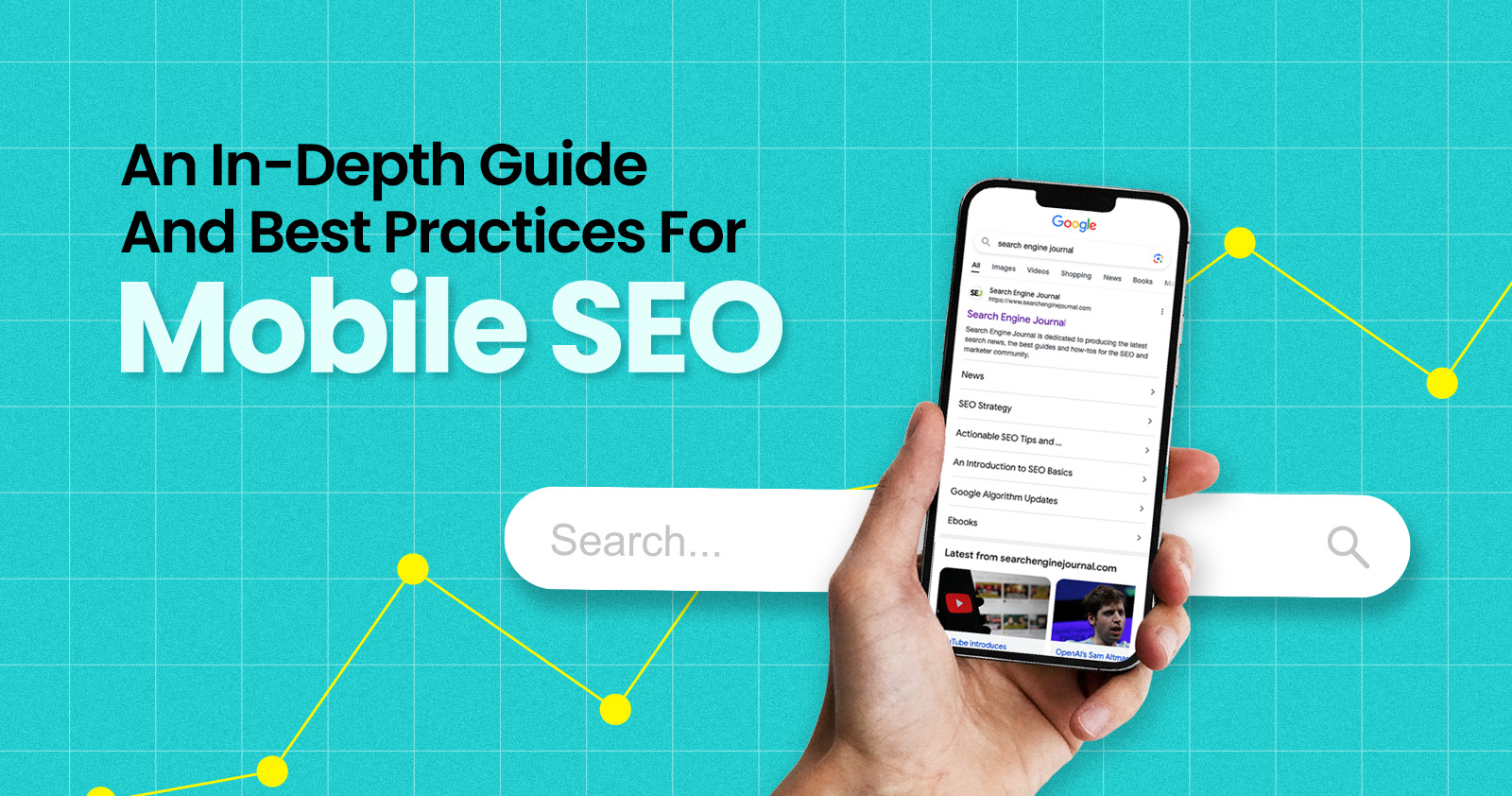
Over the years, search engines have encouraged businesses to improve mobile experience on their websites. More than 60% of web traffic comes from mobile, and in some cases based on the industry, mobile traffic can reach up to 90%.
Since Google has completed its switch to mobile-first indexing, the question is no longer “if” your website should be optimized for mobile, but how well it is adapted to meet these criteria. A new challenge has emerged for SEO professionals with the introduction of Interaction to Next Paint (INP), which replaced First Input Delay (FID) starting March, 12 2024.
Thus, understanding mobile SEO’s latest advancements, especially with the shift to INP, is crucial. This guide offers practical steps to optimize your site effectively for today’s mobile-focused SEO requirements.
What Is Mobile SEO And Why Is It Important?
The goal of mobile SEO is to optimize your website to attain better visibility in search engine results specifically tailored for mobile devices.
This form of SEO not only aims to boost search engine rankings, but also prioritizes enhancing mobile user experience through both content and technology.
While, in many ways, mobile SEO and traditional SEO share similar practices, additional steps related to site rendering and content are required to meet the needs of mobile users and the speed requirements of mobile devices.
Does this need to be a priority for your website? How urgent is it?
Consider this: 58% of the world’s web traffic comes from mobile devices.
If you aren’t focused on mobile users, there is a good chance you’re missing out on a tremendous amount of traffic.
Mobile-First Indexing
Additionally, as of 2023, Google has switched its crawlers to a mobile-first indexing priority.
This means that the mobile experience of your site is critical to maintaining efficient indexing, which is the step before ranking algorithms come into play.
Read more: Where We Are Today With Google’s Mobile-First Index
How Much Of Your Traffic Is From Mobile?
How much traffic potential you have with mobile users can depend on various factors, including your industry (B2B sites might attract primarily desktop users, for example) and the search intent your content addresses (users might prefer desktop for larger purchases, for example).
Regardless of where your industry and the search intent of your users might be, the future will demand that you optimize your site experience for mobile devices.
How can you assess your current mix of mobile vs. desktop users?
An easy way to see what percentage of your users is on mobile is to go into Google Analytics 4.
- Click Reports in the left column.
- Click on the Insights icon on the right side of the screen.
- Scroll down to Suggested Questions and click on it.
- Click on Technology.
- Click on Top Device model by Users.
- Then click on Top Device category by Users under Related Results.
- The breakdown of Top Device category will match the date range selected at the top of GA4.
You can also set up a report in Looker Studio.
- Add your site to the Data source.
- Add Device category to the Dimension field.
- Add 30-day active users to the Metric field.
- Click on Chart to select the view that works best for you.
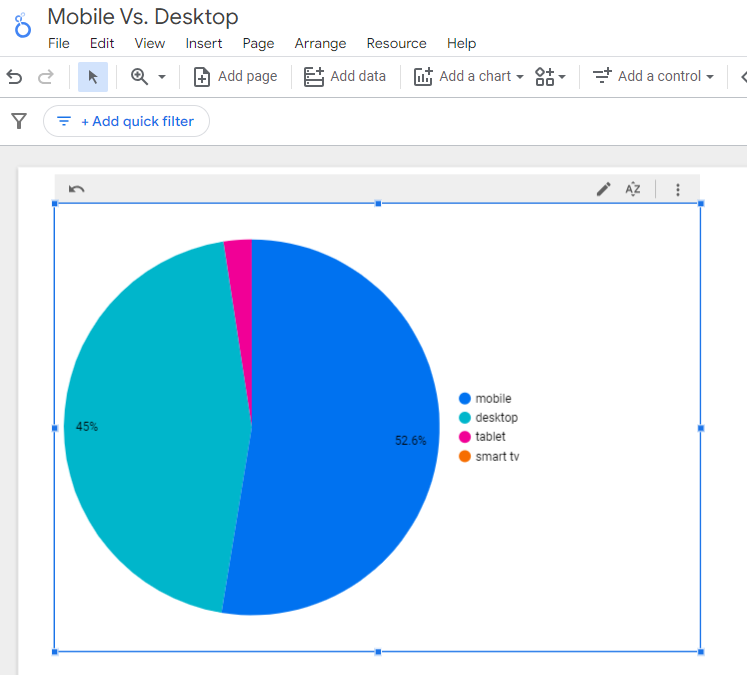 Screenshot from Looker Studio, March 2024
Screenshot from Looker Studio, March 2024You can add more Dimensions to really dig into the data to see which pages attract which type of users, what the mobile-to-desktop mix is by country, which search engines send the most mobile users, and so much more.
Read more: Why Mobile And Desktop Rankings Are Different
How To Check If Your Site Is Mobile-Friendly
Now that you know how to build a report on mobile and desktop usage, you need to figure out if your site is optimized for mobile traffic.
While Google removed the mobile-friendly testing tool from Google Search Console in December 2023, there are still a number of useful tools for evaluating your site for mobile users.
Bing still has a mobile-friendly testing tool that will tell you the following:
- Viewport is configured correctly.
- Page content fits device width.
- Text on the page is readable.
- Links and tap targets are sufficiently large and touch-friendly.
- Any other issues detected.
Google’s Lighthouse Chrome extension provides you with an evaluation of your site’s performance across several factors, including load times, accessibility, and SEO.
To use, install the Lighthouse Chrome extension.
- Go to your website in your browser.
- Click on the orange lighthouse icon in your browser’s address bar.
- Click Generate Report.
- A new tab will open and display your scores once the evaluation is complete.
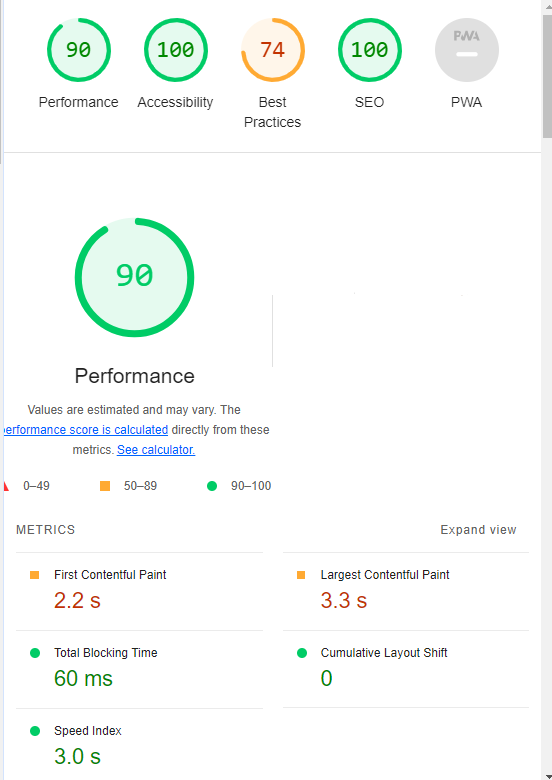 Screenshot from Lighthouse, March 2024
Screenshot from Lighthouse, March 2024You can also use the Lighthouse report in Developer Tools in Chrome.
- Simply click on the three dots next to the address bar.
- Select “More Tools.”
- Select Developer Tools.
- Click on the Lighthouse tab.
- Choose “Mobile” and click the “Analyze page load” button.
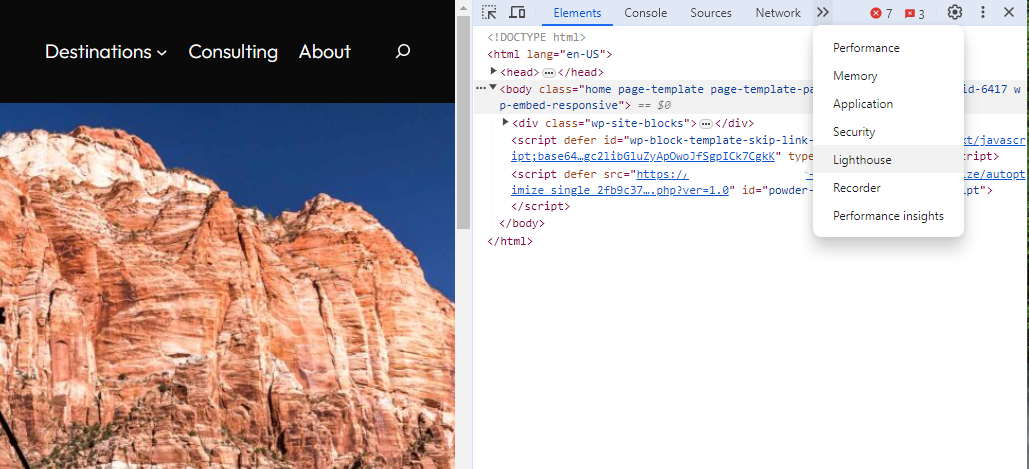 Screenshot from Lighthouse, March 2024
Screenshot from Lighthouse, March 2024Another option that Google offers is the PageSpeed Insights (PSI) tool. Simply add your URL into the field and click Analyze.
PSI will integrate any Core Web Vitals scores into the resulting view so you can see what your users are experiencing when they come to your site.
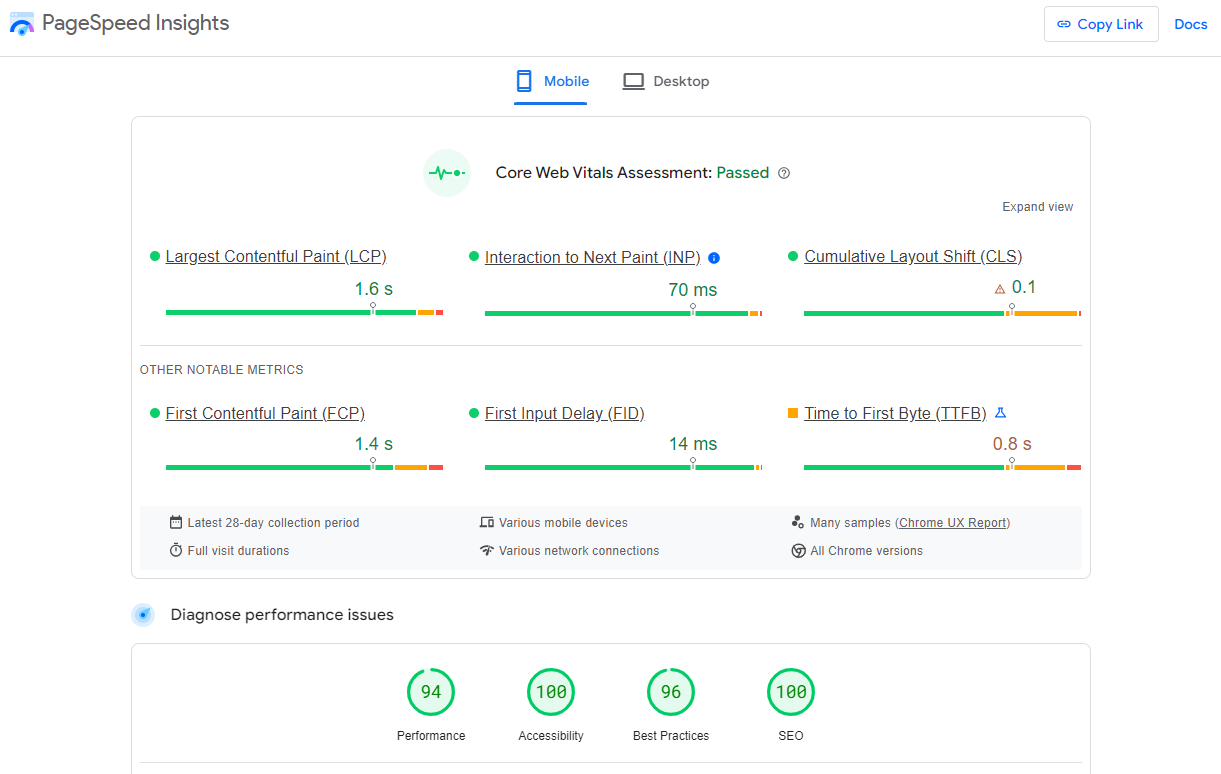 Screenshot from PageSpeed Insights, March 2024
Screenshot from PageSpeed Insights, March 2024Other tools, like WebPageTest.org, will graphically display the processes and load times for everything it takes to display your webpages.
With this information, you can see which processes block the loading of your pages, which ones take the longest to load, and how this affects your overall page load times.
You can also emulate the mobile experience by using Developer Tools in Chrome, which allows you to switch back and forth between a desktop and mobile experience.
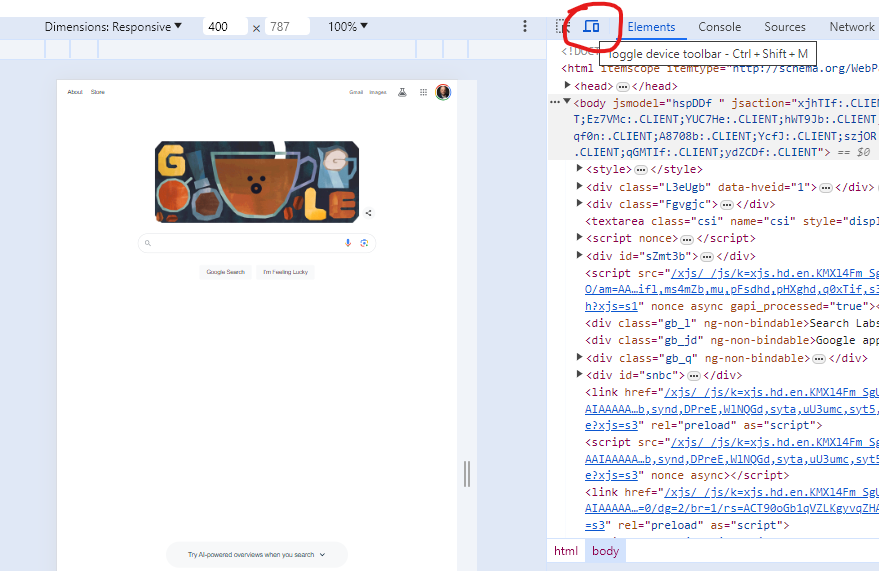 Screenshot from Google Chrome Developer Tools, March 2024
Screenshot from Google Chrome Developer Tools, March 2024Lastly, use your own mobile device to load and navigate your website:
- Does it take forever to load?
- Are you able to navigate your site to find the most important information?
- Is it easy to add something to cart?
- Can you read the text?
Read more: Google PageSpeed Insights Reports: A Technical Guide
How To Optimize Your Site Mobile-First
With all these tools, keep an eye on the Performance and Accessibility scores, as these directly affect mobile users.
Expand each section within the PageSpeed Insights report to see what elements are affecting your score.
These sections can give your developers their marching orders for optimizing the mobile experience.
While mobile speeds for cellular networks have steadily improved around the world (the average speed in the U.S. has jumped to 27.06 Mbps from 11.14 Mbps in just eight years), speed and usability for mobile users are at a premium.
Read more: Top 7 SEO Benefits Of Responsive Web Design
Best Practices For Mobile Optimization
Unlike traditional SEO, which can focus heavily on ensuring that you are using the language of your users as it relates to the intersection of your products/services and their needs, optimizing for mobile SEO can seem very technical SEO-heavy.
While you still need to be focused on matching your content with the needs of the user, mobile search optimization will require the aid of your developers and designers to be fully effective.
Below are several key factors in mobile SEO to keep in mind as you’re optimizing your site.
Site Rendering
How your site responds to different devices is one of the most important elements in mobile SEO.
The two most common approaches to this are responsive design and dynamic serving.
Responsive design is the most common of the two options.
Using your site’s cascading style sheets (CSS) and flexible layouts, as well as responsive content delivery networks (CDN) and modern image file types, responsive design allows your site to adjust to a variety of screen sizes, orientations, and resolutions.
With the responsive design, elements on the page adjust in size and location based on the size of the screen.
You can simply resize the window of your desktop browser and see how this works.
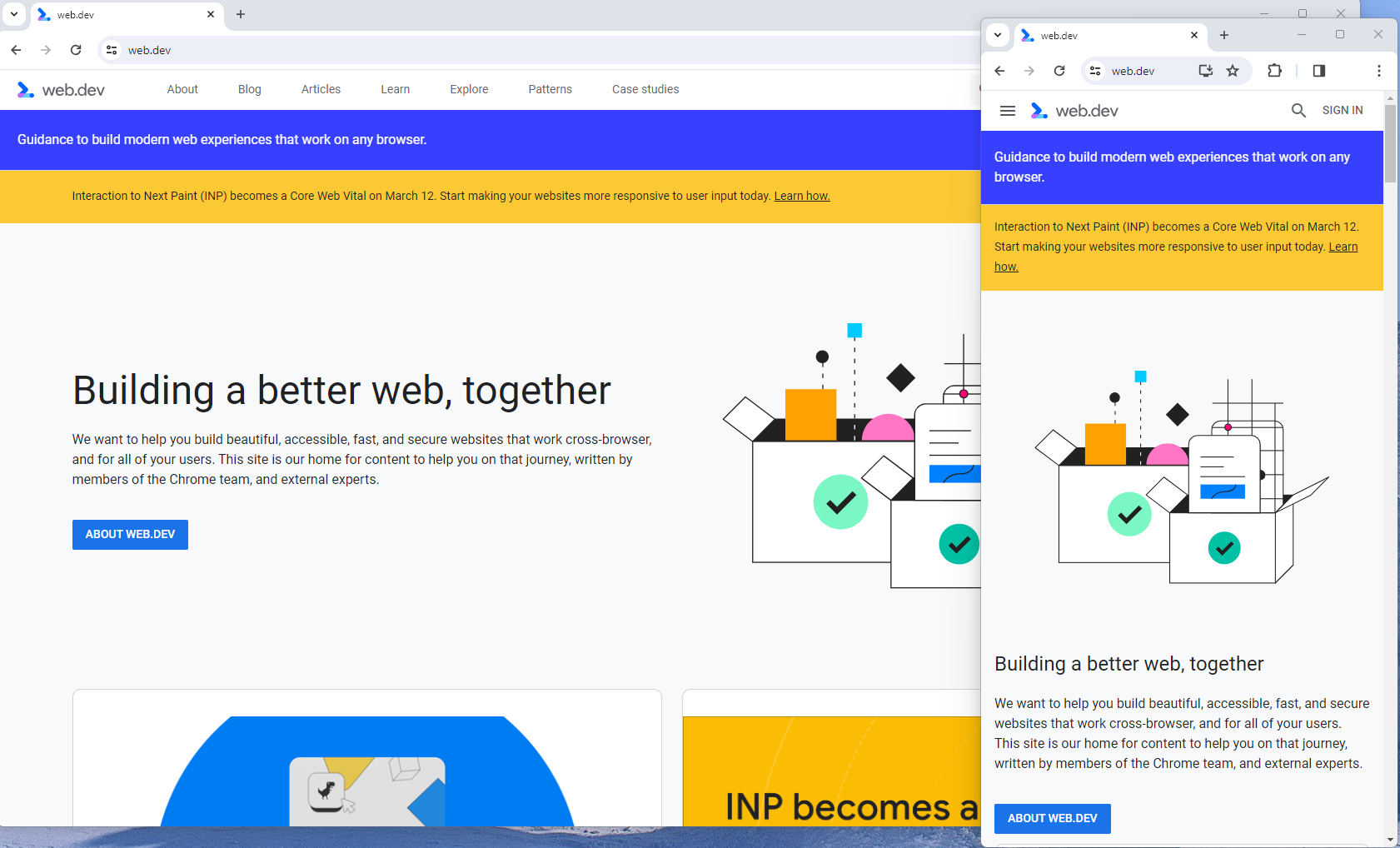 Screenshot from web.dev, March 2024
Screenshot from web.dev, March 2024This is the approach that Google recommends.
Adaptive design, also known as dynamic serving, consists of multiple fixed layouts that are dynamically served to the user based on their device.
Sites can have a separate layout for desktop, smartphone, and tablet users. Each design can be modified to remove functionality that may not make sense for certain device types.
This is a less efficient approach, but it does give sites more control over what each device sees.
While these will not be covered here, two other options:
- Progressive Web Apps (PWA), which can seamlessly integrate into a mobile app.
- Separate mobile site/URL (which is no longer recommended).
Read more: An Introduction To Rendering For SEO
Interaction to Next Paint (INP)
Google has introduced Interaction to Next Paint (INP) as a more comprehensive measure of user experience, succeeding First Input Delay. While FID measures the time from when a user first interacts with your page (e.g., clicking a link, tapping a button) to the time when the browser is actually able to begin processing event handlers in response to that interaction. INP, on the other hand, broadens the scope by measuring the responsiveness of a website throughout the entire lifespan of a page, not just first interaction.
Note that actions such as hovering and scrolling do not influence INP, however, keyboard-driven scrolling or navigational actions are considered keystrokes that may activate events measured by INP but not scrolling which is happeing due to interaction.
Scrolling may indirectly affect INP, for example in scenarios where users scroll through content, and additional content is lazy-loaded from the API. While the act of scrolling itself isn’t included in the INP calculation, the processing, necessary for loading additional content, can create contention on the main thread, thereby increasing interaction latency and adversely affecting the INP score.
What qualifies as an optimal INP score?
- An INP under 200ms indicates good responsiveness.
- Between 200ms and 500ms needs improvement.
- Over 500ms means page has poor responsiveness.
and these are common issues causing poor INP scores:
- Long JavaScript Tasks: Heavy JavaScript execution can block the main thread, delaying the browser’s ability to respond to user interactions. Thus break long JS tasks into smaller chunks by using scheduler API.
- Large DOM (HTML) Size: A large DOM ( starting from 1500 elements) can severely impact a website’s interactive performance. Every additional DOM element increases the work required to render pages and respond to user interactions.
- Inefficient Event Callbacks: Event handlers that execute lengthy or complex operations can significantly affect INP scores. Poorly optimized callbacks attached to user interactions, like clicks, keypress or taps, can block the main thread, delaying the browser’s ability to render visual feedback promptly. For example when handlers perform heavy computations or initiate synchronous network requests such on clicks.
and you can troubleshoot INP issues using free and paid tools.
As a good starting point I would recommend to check your INP scores by geos via treo.sh which will give you a great high level insights where you struggle with most.
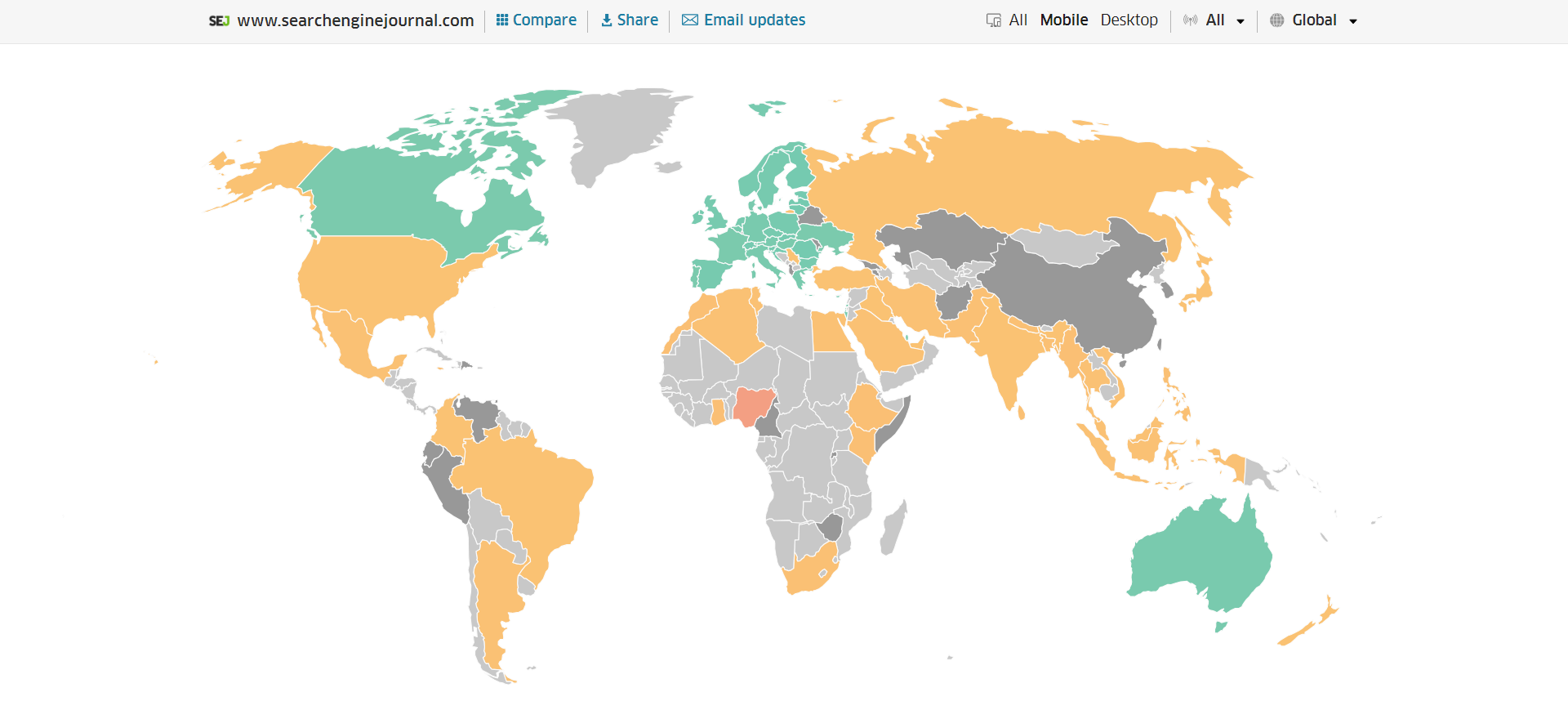 INP scores by Geos
INP scores by GeosRead more: How To Improve Interaction To Next Paint (INP)
Image Optimization
Images add a lot of value to the content on your site and can greatly affect the user experience.
From page speeds to image quality, you could adversely affect the user experience if you haven’t optimized your images.
This is especially true for the mobile experience. Images need to adjust to smaller screens, varying resolutions, and screen orientation.
- Use responsive images
- Implement lazy loading
- Compress your images (use WebP)
- Add your images into sitemap
Optimizing images is an entire science, and I advise you to read our comprehensive guide on image SEO how to implement the mentioned recommendations.
Avoid Intrusive Interstitials
Google rarely uses concrete language to state that something is a ranking factor or will result in a penalty, so you know it means business about intrusive interstitials in the mobile experience.
Intrusive interstitials are basically pop-ups on a page that prevent the user from seeing content on the page.
John Mueller, Google’s Senior Search Analyst, stated that they are specifically interested in the first interaction a user has after clicking on a search result.

Not all pop-ups are considered bad. Interstitial types that are considered “intrusive” by Google include:
- Pop-ups that cover most or all of the page content.
- Non-responsive interstitials or pop-ups that are impossible for mobile users to close.
- Pop-ups that are not triggered by a user action, such as a scroll or a click.
Read more: 7 Tips To Keep Pop-Ups From Harming Your SEO
Structured Data
Most of the tips provided in this guide so far are focused on usability and speed and have an additive effect, but there are changes that can directly influence how your site appears in mobile search results.
Search engine results pages (SERPs) haven’t been the “10 blue links” in a very long time.
They now reflect the diversity of search intent, showing a variety of different sections to meet the needs of users. Local Pack, shopping listing ads, video content, and more dominate the mobile search experience.
As a result, it’s more important than ever to provide structured data markup to the search engines, so they can display rich results for users.
In this example, you can see that both Zojirushi and Amazon have included structured data for their rice cookers, and Google is displaying rich results for both.
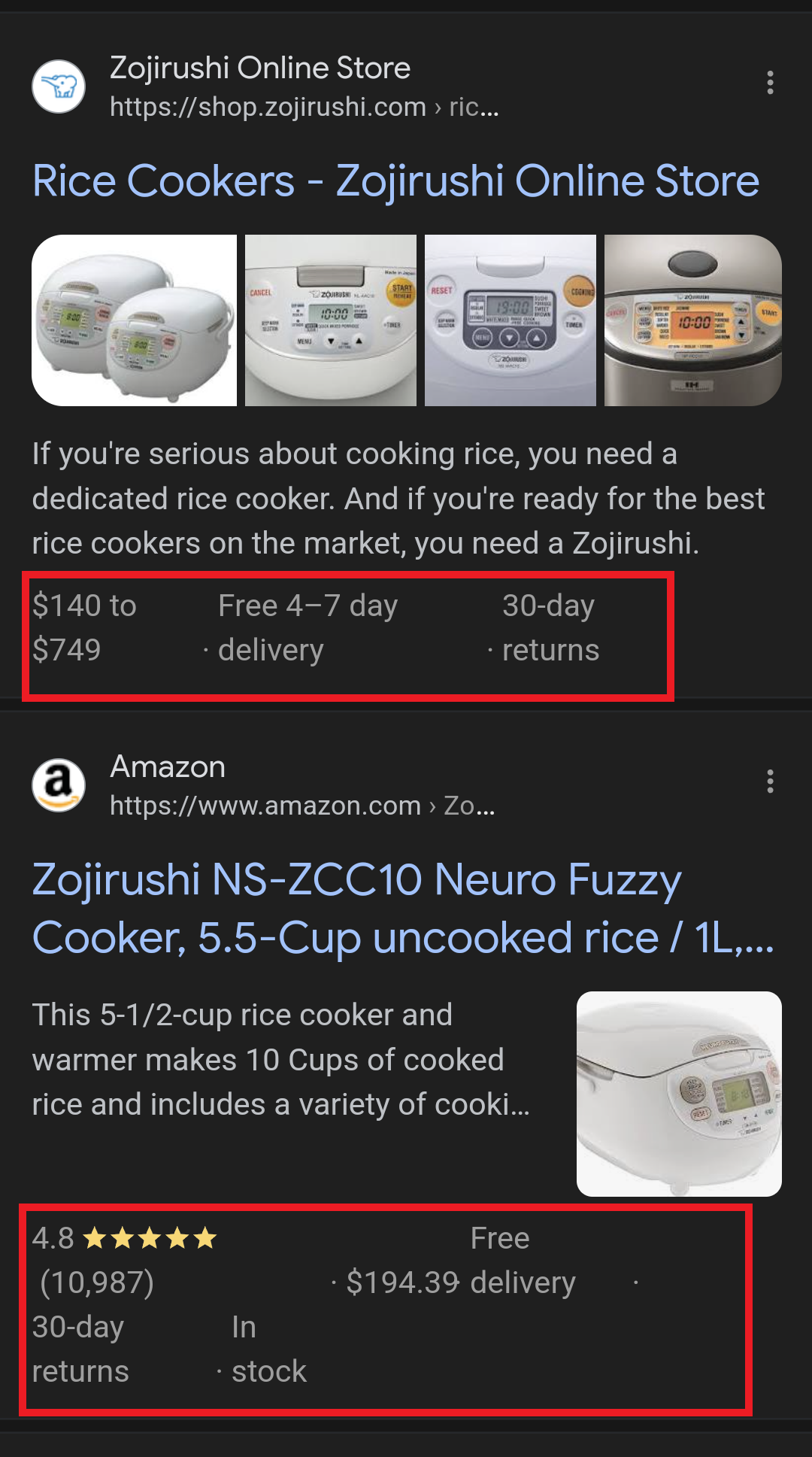 Screenshot from search for [Japanese rice cookers], Google, March 2024
Screenshot from search for [Japanese rice cookers], Google, March 2024Adding structured data markup to your site can influence how well your site shows up for local searches and product-related searches.
Using JSON-LD, you can mark up the business, product, and services data on your pages in Schema markup.
If you use WordPress as the content management system for your site, there are several plugins available that will automatically mark up your content with structured data.
Read more: What Structured Data To Use And Where To Use It?
Content Style
When you think about your mobile users and the screens on their devices, this can greatly influence how you write your content.
Rather than long, detailed paragraphs, mobile users prefer concise writing styles for mobile reading.
Each key point in your content should be a single line of text that easily fits on a mobile screen.
Your font sizes should adjust to the screen’s resolution to avoid eye strain for your users.
If possible, allow for a dark or dim mode for your site to further reduce eye strain.
Headers should be concise and address the searcher’s intent. Rather than lengthy section headers, keep it simple.
Finally, make sure that your text renders in a font size that’s readable.
Read more: 10 Tips For Creating Mobile-Friendly Content
Tap Targets
As important as text size, the tap targets on your pages should be sized and laid out appropriately.
Tap targets include navigation elements, links, form fields, and buttons like “Add to Cart” buttons.
Targets smaller than 48 pixels by 48 pixels and targets that overlap or are overlapped by other page elements will be called out in the Lighthouse report.
Tap targets are essential to the mobile user experience, especially for ecommerce websites, so optimizing them is vital to the health of your online business.
Read more: Google’s Lighthouse SEO Audit Tool Now Measures Tap Target Spacing
Prioritizing These Tips
If you have delayed making your site mobile-friendly until now, this guide may feel overwhelming. As a result, you may not know what to prioritize first.
As with so many other optimizations in SEO, it’s important to understand which changes will have the greatest impact, and this is just as true for mobile SEO.
Think of SEO as a framework in which your site’s technical aspects are the foundation of your content. Without a solid foundation, even the best content may struggle to rank.
- Responsive or Dynamic Rendering: If your site requires the user to zoom and scroll right or left to read the content on your pages, no number of other optimizations can help you. This should be first on your list.
- Content Style: Rethink how your users will consume your content online. Avoid very long paragraphs. “Brevity is the soul of wit,” to quote Shakespeare.
- Image Optimization: Begin migrating your images to next-gen image formats and optimize your content display network for speed and responsiveness.
- Tap Targets: A site that prevents users from navigating or converting into sales won’t be in business long. Make navigation, links, and buttons usable for them.
- Structured Data: While this element ranks last in priority on this list, rich results can improve your chances of receiving traffic from a search engine, so add this to your to-do list once you’ve completed the other optimizations.
Summary
From How Search Works, “Google’s mission is to organize the world’s information and make it universally accessible and useful.”
If Google’s primary mission is focused on making all the world’s information accessible and useful, then you know they will prefer surfacing sites that align with that vision.
Since a growing percentage of users are on mobile devices, you may want to infer the word “everywhere” added to the end of the mission statement.
Are you missing out on traffic from mobile devices because of a poor mobile experience?
If you hope to remain relevant, make mobile SEO a priority now.
Featured Image: Paulo Bobita/Search Engine Journal
SEO
HARO Has Been Dead for a While

I know nothing about the new tool. I haven’t tried it. But after trying to use HARO recently, I can’t say I’m surprised or saddened by its death. It’s been a walking corpse for a while.
I used HARO way back in the day to build links. It worked. But a couple of months ago, I experienced the platform from the other side when I decided to try to source some “expert” insights for our posts.
After just a few minutes of work, I got hundreds of pitches:
So, I grabbed a cup of coffee and began to work through them. It didn’t take long before I lost the will to live. Every other pitch seemed like nothing more than lazy AI-generated nonsense from someone who definitely wasn’t an expert.
Here’s one of them:
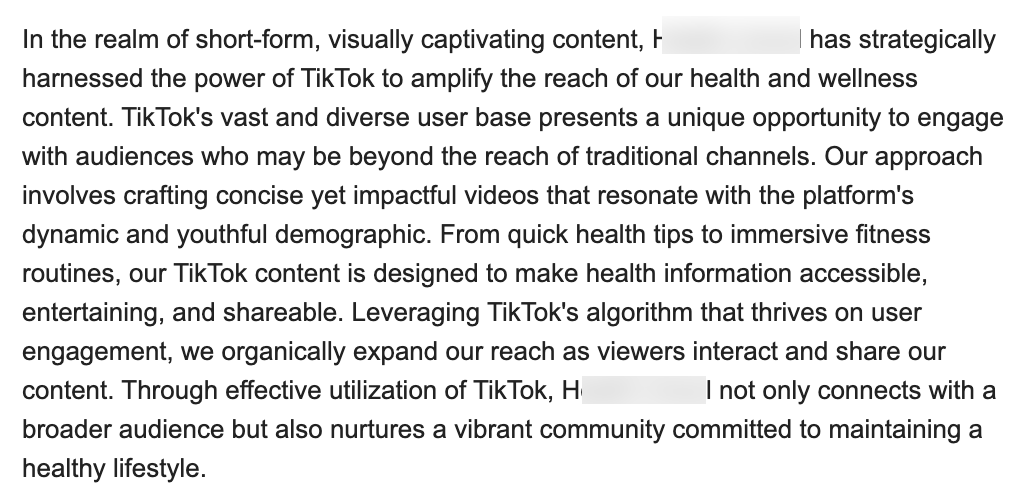

Seriously. Who writes like that? I’m a self-confessed dullard (any fellow Dull Men’s Club members here?), and even I’m not that dull…
I don’t think I looked through more than 30-40 of the responses. I just couldn’t bring myself to do it. It felt like having a conversation with ChatGPT… and not a very good one!
Despite only reviewing a few dozen of the many pitches I received, one stood out to me:


Believe it or not, this response came from a past client of mine who runs an SEO agency in the UK. Given how knowledgeable and experienced he is (he actually taught me a lot about SEO back in the day when I used to hassle him with questions on Skype), this pitch rang alarm bells for two reasons:
- I truly doubt he spends his time replying to HARO queries
- I know for a fact he’s no fan of Neil Patel (sorry, Neil, but I’m sure you’re aware of your reputation at this point!)
So… I decided to confront him 😉
Here’s what he said:
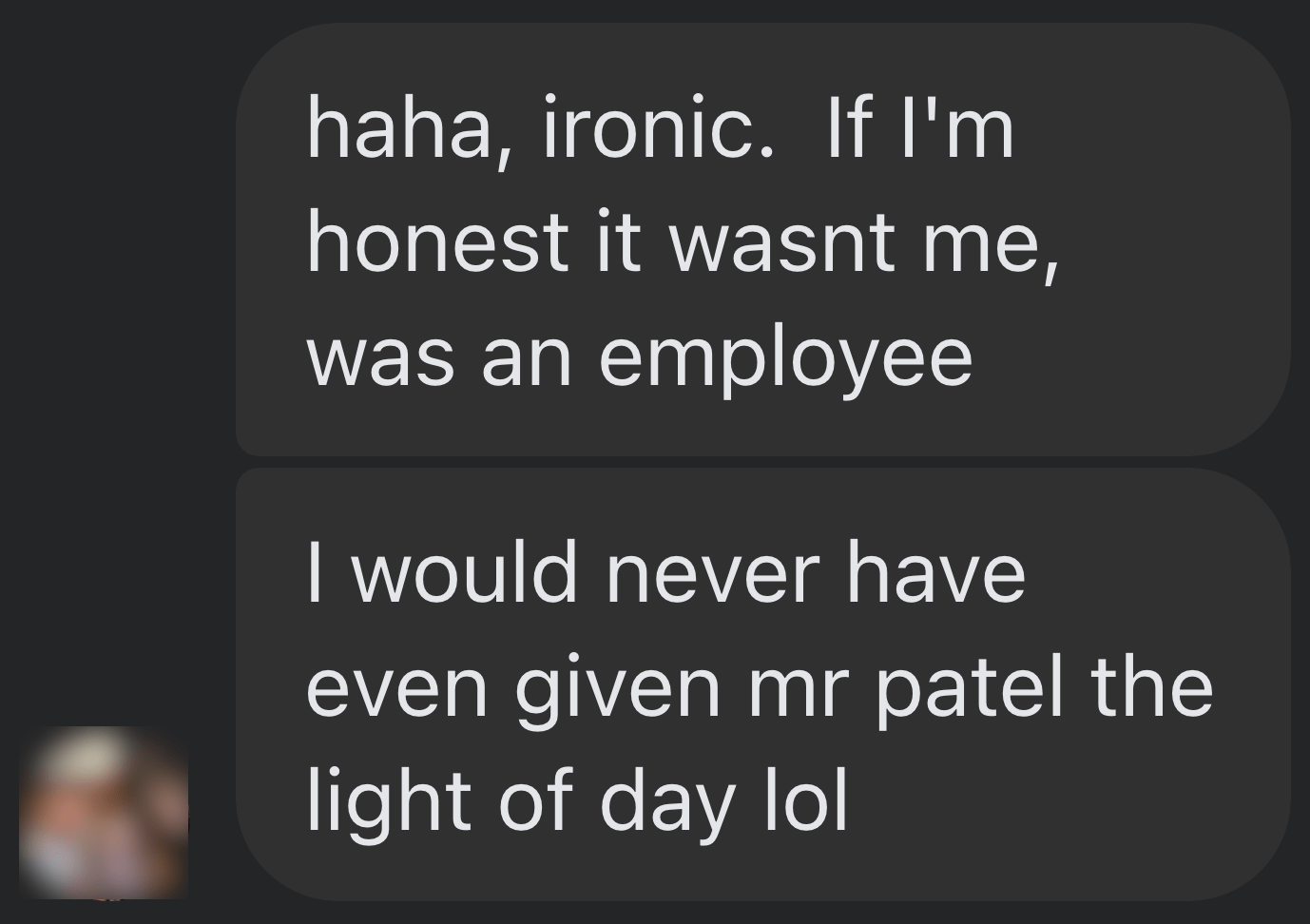

Shocker.
I pressed him for more details:
I’m getting a really good deal and paying per link rather than the typical £xxxx per month for X number of pitches. […] The responses as you’ve seen are not ideal but that’s a risk I’m prepared to take as realistically I dont have the time to do it myself. He’s not native english, but I have had to have a word with him a few times about clearly using AI. On the low cost ones I don’t care but on authority sites it needs to be more refined.
I think this pretty much sums up the state of HARO before its death. Most “pitches” were just AI answers from SEOs trying to build links for their clients.
Don’t get me wrong. I’m not throwing shade here. I know that good links are hard to come by, so you have to do what works. And the reality is that HARO did work. Just look at the example below. You can tell from the anchor and surrounding text in Ahrefs that these links were almost certainly built with HARO:
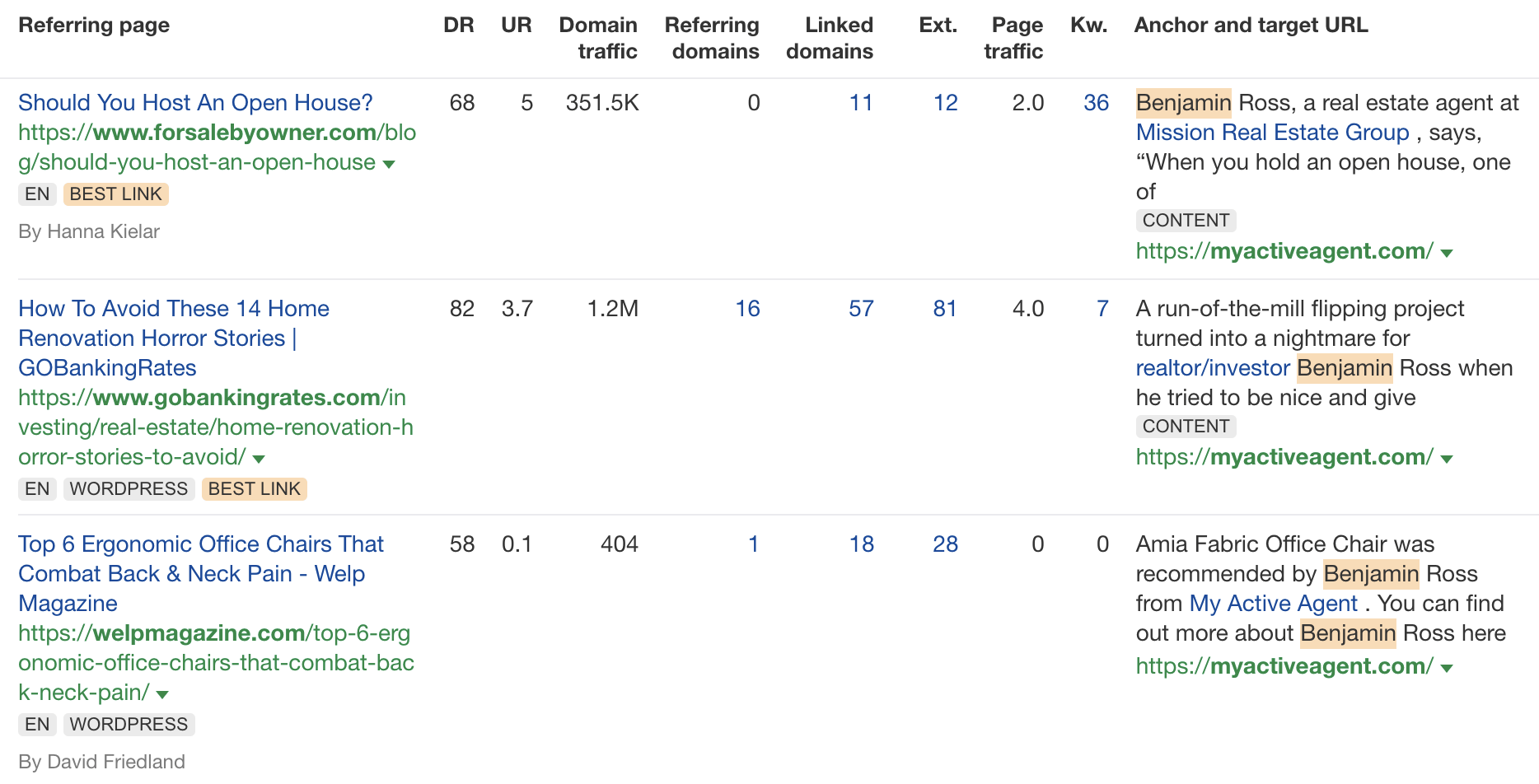

But this was the problem. HARO worked so well back in the day that it was only a matter of time before spammers and the #scale crew ruined it for everyone. That’s what happened, and now HARO is no more. So…
If you’re a link builder, I think it’s time to admit that HARO link building is dead and move on.
No tactic works well forever. It’s the law of sh**ty clickthroughs. This is why you don’t see SEOs having huge success with tactics like broken link building anymore. They’ve moved on to more innovative tactics or, dare I say it, are just buying links.
Sidenote.
Talking of buying links, here’s something to ponder: if Connectively charges for pitches, are links built through those pitches technically paid? If so, do they violate Google’s spam policies? It’s a murky old world this SEO lark, eh?
If you’re a journalist, Connectively might be worth a shot. But with experts being charged for pitches, you probably won’t get as many responses. That might be a good thing. You might get less spam. Or you might just get spammed by SEOs with deep pockets. The jury’s out for now.
My advice? Look for alternative methods like finding and reaching out to experts directly. You can easily use tools like Content Explorer to find folks who’ve written lots of content about the topic and are likely to be experts.
For example, if you look for content with “backlinks” in the title and go to the Authors tab, you might see a familiar name. 😉
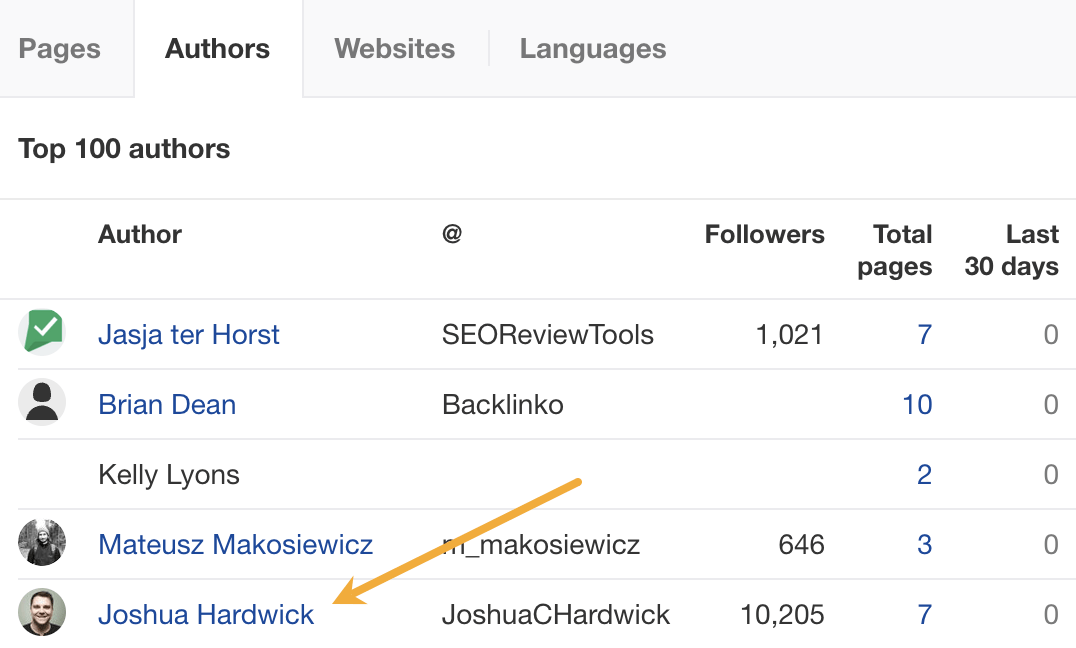

I don’t know if I’d call myself an expert, but I’d be happy to give you a quote if you reached out on social media or emailed me (here’s how to find my email address).
Alternatively, you can bait your audience into giving you their insights on social media. I did this recently with a poll on X and included many of the responses in my guide to toxic backlinks.
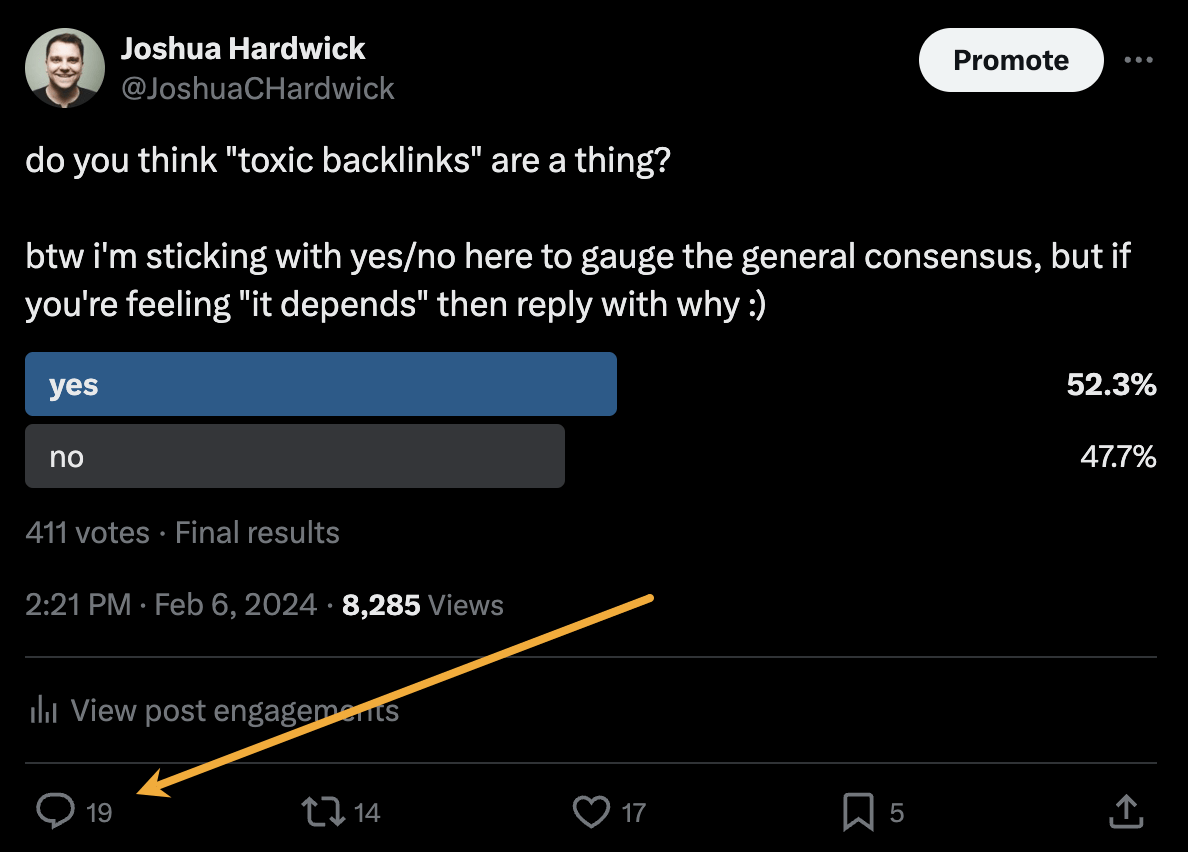

Either of these options is quicker than using HARO because you don’t have to sift through hundreds of responses looking for a needle in a haystack. If you disagree with me and still love HARO, feel free to tell me why on X 😉
-

 SEO7 days ago
SEO7 days agoGoogle Limits News Links In California Over Proposed ‘Link Tax’ Law
-

 SEARCHENGINES6 days ago
SEARCHENGINES6 days agoGoogle Core Update Volatility, Helpful Content Update Gone, Dangerous Google Search Results & Google Ads Confusion
-
SEARCHENGINES7 days ago
Daily Search Forum Recap: April 12, 2024
-

 SEO6 days ago
SEO6 days ago10 Paid Search & PPC Planning Best Practices
-

 MARKETING6 days ago
MARKETING6 days ago2 Ways to Take Back the Power in Your Business: Part 2
-

 MARKETING4 days ago
MARKETING4 days ago5 Psychological Tactics to Write Better Emails
-

 SEARCHENGINES5 days ago
SEARCHENGINES5 days agoWeekend Google Core Ranking Volatility
-

 PPC6 days ago
PPC6 days agoCritical Display Error in Brand Safety Metrics On Twitter/X Corrected















You must be logged in to post a comment Login